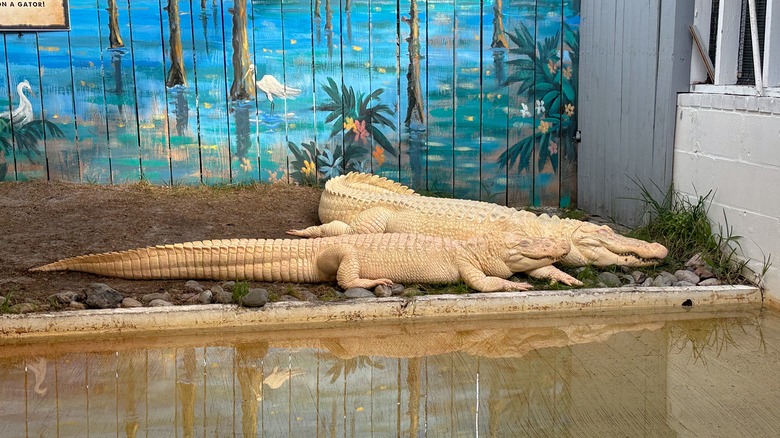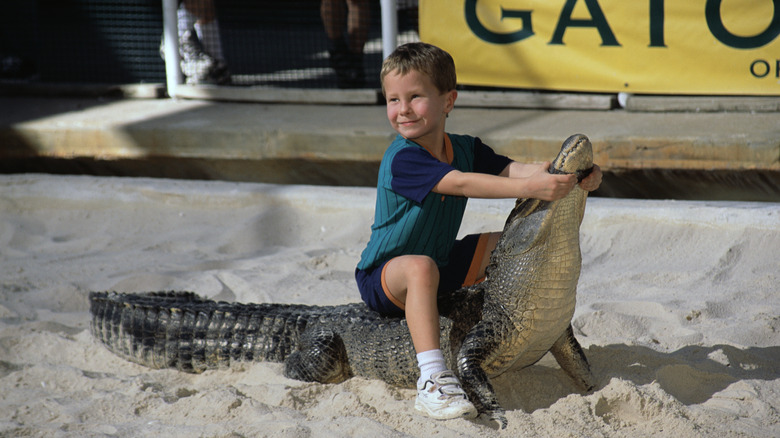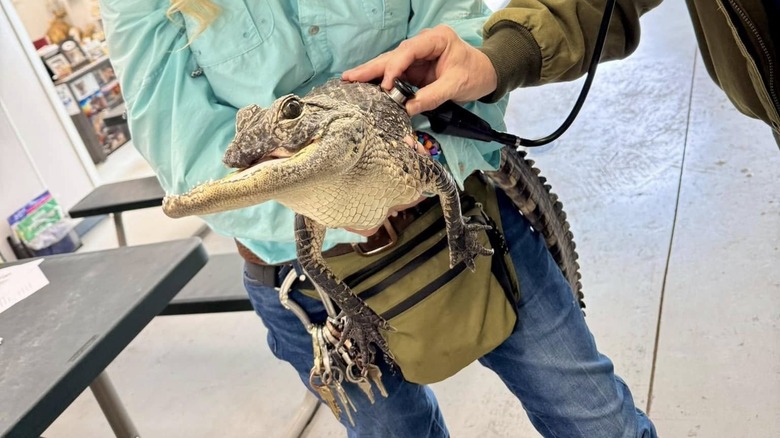Florida's Unique And Popular Wildlife Attraction Is A Disappointing Tourist Trap With Troublesome Issues
With so many incredible things to do in Orlando beyond Disney World, it might come as a surprise that the city is often considered one of Florida's most disappointing destinations. This reputation stems largely from its many tourist traps — including Gatorland. "The Alligator Capital of the World," as the park calls itself, offers close encounters with alligators, crocodiles, and other wildlife, along with several shows and attractions. And while some visitors may find this gator park fun and entertaining, many others have raised concerns over issues like alleged animal abuse and high entrance fees. This unflattering combination could indeed turn the experience into a disappointment for many tourists.
Gatorland is located at 14501 South Orange Blossom Trail. It is a 110-acre wildlife park established in 1949 as a roadside attraction showcasing Florida's iconic alligators. Today, the park has expanded its collection to include other animals such as capybaras, parakeets, Florida panthers, snakes, and tortoises, among other species.
The park's general admission fees are not the cheapest, starting at $35 for adults and $25 for children at the time of writing. These fees include access to some of Gatorland's attractions — including the free-flight aviary and petting zoo — and three animal shows. Animal exhibits such as the rare leucistic white gators and Florida panthers are also included in the cost of admission.
The troublesome issues surrounding Gatorland
Gatorland has been a part of Orlando for more than 70 years, making it one of the city's oldest and most beloved destinations. But, sadly, that doesn't mean the place is without issues — especially when it comes to the ethical treatment of animals and the park's accreditation.
For starters, many travelers have pointed out that Gatorland — unlike many of the best zoos and wildlife parks in the U.S. — is not accredited by the Association of Zoos and Aquariums. This has raised concerns among some visitors about the wellbeing of the animals. According to World Animal Protection, Gatorland's budgerigars — one of its in-house parakeet species — were suffering from neglect due to overcrowding, unsupervised guests, and a less-than-suitable veterinary program. The park got served with an official warning in 2024 for this. To make matters worse, the United States Department of Agriculture noted that in 2023 that Gatorland's written veterinary care did not have any information on how to care for its hundreds of parakeets.
Along the same lines, expert researchers from New York University's Animal Research Program have raised concerns (via People) regarding the educational and conservation value of animal shows such as Gatorland's alligator wrestling. These experts argue that such activities may harm animals without offering real conservation benefits. Additionally, organizations such as the Born Free Foundation and Four Paws International as well as users on travel platforms like Tripadvisor have stated that close encounters and physical interactions with captive wildlife at places like Gatorland are unethical and exploitative.
Despite these ethics issues, Gatorland claims to aid in wildlife conservation
With such claims and allegations regarding the welfare of Gatorland's animals, many may feel hesitant about supporting the park. And while it's important to inform the public about these issues, it's also worth highlighting the good work done by "The Alligator Capital of the World."
According to Business Insider, staff at Gatorland said that many of their alligators were rescued from hunters or motorboat accidents and are either undergoing rehabilitation or live there because they cannot survive in the wild. The park also partners with the Florida Fish and Wildlife Conservation Commission to rescue alligators from euthanasia — particularly those caught after "trespassing" on resorts, golf courses, or other places where they're considered a nuisance. In 2017, the park launched a nonprofit arm called Gatorland Global to further advance alligator and crocodile conservation and as raise awareness about their ecological importance both globally and within the U.S.
Regardless of how commendable these efforts may seem, it would be wise for visitors to remain critical when considering a visit to the park. Some activities and animal interactions — such as the gator performances — may still raise ethical concerns that should be addressed. In order to have an informed opinion, visitors should also learn about the reptiles' natural behavior. Fortunately, these creatures can be easily observed in the wild at places like Florida's alligator-filled Lake Jesup, among other gator-filled destinations across Florida.


